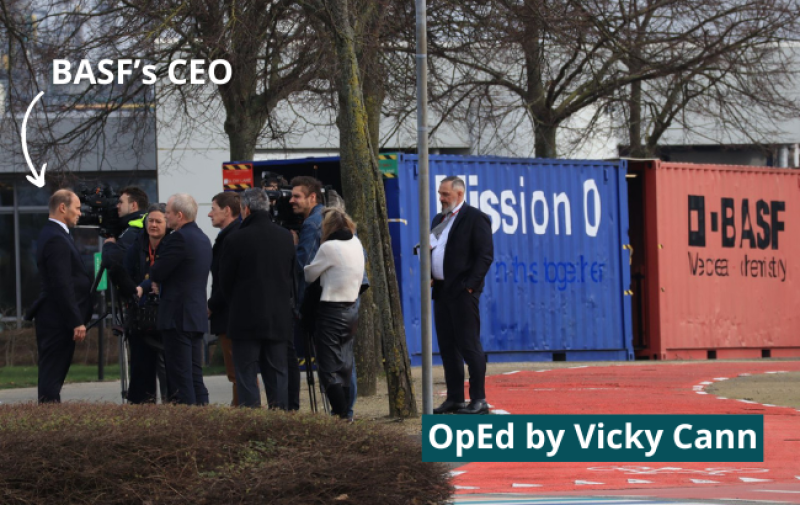Stay always informed
Interested in our articles? Get the latest information and analysis straight to your email. Sign up for our newsletter.

EU politicians will cosy up with Big Toxics at a secretive event on Tuesday (20 February) to discuss a new 'European Industrial Deal' — a blatant showcase of corporate capture and an attempt to shift the political agenda in a more profit-minded direction.
This article was written by Vicky Cann (CEO) and originally appeared in EU Observer.
While there is little information in the public domain about the Big Toxics lobby event, the European Industrial Deal has been much trailed. This comes amid the Green Deal's many broken promises, including reducing and replacing hazardous substances that harm health and ecosystems.
In his address to the European Parliament last month, Belgian prime minister Alexander De Croo proposed an industrial deal based on "carrots" for industry to help it develop a 'green economy' and compete with China and the US, especially since the latter's Inflation Reduction Act.
"In Europe, we too often use only the stick," he said.
But De Croo's "carrots" are problematic, and include false solutions to the climate crisis such as hydrogen and carbon capture and storage, as part of the wider 'net zero' agenda, labelled a "big con" by green groups.
And rhetorically at least, action on the toxic pollution and biodiversity crises appears to be deprioritised.
Other components of an industrial deal could include a commitment to avoid a heavier legislative 'burden' for industry and support for affordable energy prices (but only for industry, not ordinary consumers).
Such demands are all couched in the framework of strengthening the EU Single Market, and the industry aims for a new EU commissioner role to deliver it all.
For the chemicals industry, and other sectors which rely heavily on fossil fuels, this industrial deal is a welcome outcome of the lobby narrative that they have been weaving for years, most recently in the Green Deal.
That narrative goes something like this: the sector risks being 'overburdened' with regulation, especially those promised as part of the Green Deal's Chemicals Strategy for Sustainability and Farm to Fork; these and recent geopolitical developments such as high energy costs threaten to lead to EU deindustrialisation as the sector is driven overseas; and the chemicals sector is crucial to the development of an EU green economy and its digital ambition, so it needs support.
Reinforcing the industry's narrative has been a series of industry-commissioned studies which have rang loud alarm bells about the impacts of these legislative proposals. Corporate Europe Observatory has analysed the role of such studies in sabotaging the proposed pesticide reduction target.
Now Corporate Europe Observatory's new analysis reveals how an impact study by CEFIC into the proposed REACH reform gained huge traction with politicians and the media, even though the study was largely based on the views of its big business members.
Like all other industry-funded 'impact studies' we have seen in recent years, the CEFIC approach was flawed. It did not look at the health and environmental benefits of revised chemical regulations nor the business opportunities from the transition to safe and sustainable chemicals.
While the industry is keen to focus the debate on the so-called 'burdens' on industry, the burdens on communities and biodiversity of the toxic pollution crisis are often sidelined.
But these burdens are real: European citizens are exposed to "alarmingly high levels of chemical substances", linked to cancer, infertility, obesity, and asthma, and these substances also contribute to the collapse of insect, bird, and mammal populations.
And while the industry complains about the hit to its sales and profits were it takes hazardous substances off the market, the hit to the public purse, running into billions and billions, of tackling the health impacts of toxic pollution or of trying to clean it up from the environment, are also not considered.
Instead, EU politicians have chosen to adopt industry arguments seemingly for electoral gain.
From calls by French president Emmanuel Macron and Belgium's De Croo for a pause in new environmental rules, giving in to right-wing demands for a regulatory moratorium, and to the fading of commission president Ursula von der Leyen's promises to reform REACH, cut pesticide use, and to stop the export of already banned hazardous substances, politicians are delivering industry's agenda on a plate.
According to Eurostat, the chemicals industry has enjoyed steady growth in the past 10 years or more. This makes it even more remarkable that the decades and decades of corporate decision-making that put hazardous substances into consumer, industrial, and agricultural products in the first place, is now apparently to be rewarded with a business-friendly Industrial Deal.
Tuesday's event, hosted at BASF's Antwerp plant, coordinated by CEFIC and its Belgian member Essenscia, will see De Croo, von der Leyen, and regional political leaders getting together with 60 or more big business leaders.
Neither local communities from the Antwerp region suffering from the shocking 'forever chemicals' PFAS pollution caused by 3M and others, nor green groups, were invited.
Organised under the auspices of the Belgian presidency of the EU, it is a shocking symbol of the pro-business approach of EU decision-making on environmental and climate policy.
That's why more than 70 NGOs have written an open letter to De Croo, to demand an end to privileged access for polluting industries and ambitious action on the toxic pollution, biodiversity, and climate crises.
And while politicians and corporate leaders hobnob behind closed doors, the interests of polluted communities across Europe and beyond are seemingly left outside.
It's time to reset the dial on the corporate capture of EU and member states by the fossil fuel and chemicals industries. We need toxic-free politics now.